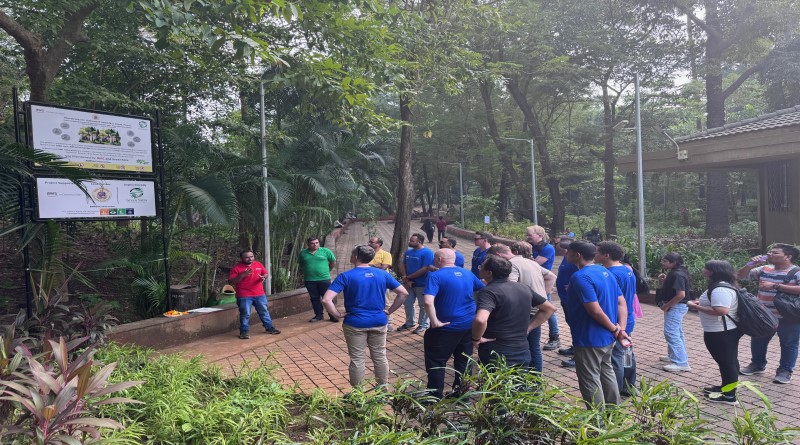AWS InCommunities Launches Biodiversity Conservation Projects in Powai and Malad

AWS plants over 8,000 native saplings to restore green spaces in Mumbai
Delhi: Amazon Web Services (AWS) India Private Limited has launched two major biodiversity conservation projects in Mumbai, focusing on reforestation and habitat restoration in Powai and Malad. These initiatives are part of the AWS InCommunities program, aimed at promoting environmental sustainability and community development in regions where AWS operates.
Plantation of 4,500 Native Saplings in Powai
One of the flagship projects involves the plantation of 4,500 native saplings across eight different locations within Dr. Ambedkar Udyan in Powai. AWS InCommunities is collaborating with Green Yatra Trust, a nonprofit organization, to carry out this massive plantation drive. The saplings planted are carefully selected to represent 106 species native to India, including medicinal, pollinator-friendly, flowering, and various other types of trees. This initiative is designed to enhance biodiversity in the area and help preserve native ecosystems.
Diversity of Tree Species
One unique aspect of this project is the inclusion of trees native to different Indian states, ensuring a diverse range of species from across the country. Each section of the plantation will be accompanied by information boards detailing the saplings and their significance, providing visitors with insights into the species being planted and their ecological importance.
Biodiversity Restoration at Sanjay Gandhi National Park
In addition to the Powai initiative, AWS InCommunities is also undertaking a biodiversity restoration project at Sanjay Gandhi National Park in Malad. As part of this project, more than 3,500 native saplings will be planted to help restore a portion of the forest area. This effort builds on AWS’s previous conservation activities in the region, adding to the 6,500 saplings that were planted in the park in 2023.
Inauguration Ceremony and Leadership Participation
The inauguration of the biodiversity conservation project at Dr. Ambedkar Udyan took place on October 15, 2024. The event was attended by Jonathan Price, Director of Data Center Design Engineering, AWS (Australia), Munish Kumar, Senior Data Center Design Delivery Manager, AWS India, and other leaders from AWS. The dignitaries officially launched one of the tree plantation sites, unveiled a board with details of the project, and participated in the plantation of saplings to kick off the initiative.
AWS InCommunities’ Focus on Holistic Community Development
The biodiversity conservation efforts in Mumbai are part of AWS InCommunities’ broader mission to positively impact communities through sustainable initiatives. Launched in India in 2018, the program began with projects in Navi Mumbai, before expanding to Telangana’s Rangareddy district in 2020. AWS InCommunities focuses on holistic community development, including environmental conservation, education, healthcare, and economic empowerment.
Previous Environmental Projects by AWS InCommunities
In 2022, AWS InCommunities undertook several key environmental initiatives, including the construction of a wildlife underpass beneath the Mumbai-Goa highway to facilitate safe movement for wild animals. The program also installed informative boards and water purifiers at the Karnala Wildlife Sanctuary to promote tourism and improve visitor facilities.
A Commitment to a Greener Future
Through the AWS InCommunities program, Amazon Web Services continues to demonstrate its commitment to environmental sustainability and community development. By restoring green spaces and promoting biodiversity in Mumbai, AWS is not only contributing to the local ecosystem but also setting an example of corporate responsibility in the fight against climate change. The projects in Powai and Malad are a testament to the positive impact that can be achieved through collaborative conservation efforts.
Follow for more information.







I appreciate your work, appreciate it for all the useful posts.
I’m impressed, I have to say. Really not often do I encounter a weblog that’s both educative and entertaining, and let me let you know, you’ve hit the nail on the head. Your thought is excellent; the difficulty is one thing that not enough individuals are talking intelligently about. I am very completely satisfied that I stumbled across this in my search for something relating to this.
Appreciating the dedication you put into your blog and detailed information you offer. It’s nice to come across a blog every once in a while that isn’t the same old rehashed information. Great read! I’ve bookmarked your site and I’m including your RSS feeds to my Google account.
I think other site proprietors should take this site as an model, very clean and fantastic user friendly style and design, let alone the content. You are an expert in this topic!
Fantastic site. Plenty of helpful info here. I am sending it to a few buddies ans additionally sharing in delicious. And naturally, thanks on your effort!